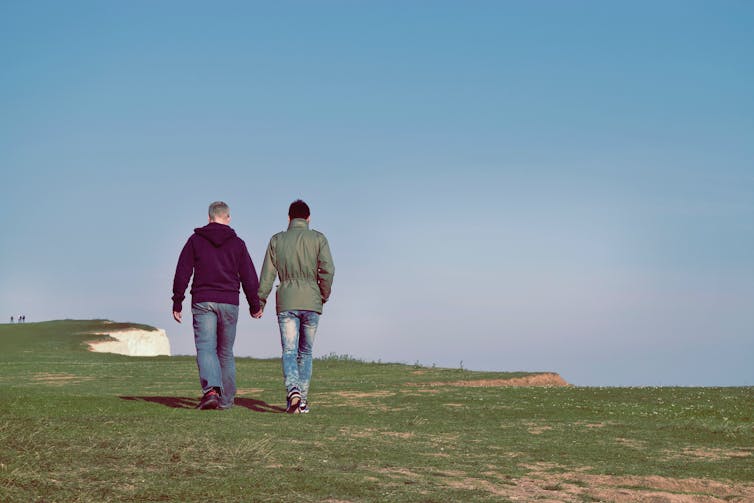Why has same-sex sexual behaviour persisted during evolution?
- Written by Brendan Zietsch, Associate Professor, The University of Queensland
Same-sex sexual behaviour may seem to present a Darwinian paradox. It provides no obvious reproductive or survival benefit, and yet same-sex sexual behaviour is fairly common — around 2-10% of individuals[1] in diverse human societies[2] — and is clearly influenced by genes[3].
These observations raise the question: why have genes associated with same-sex sexual behaviour been maintained over evolutionary time? Given that evolution depends on genes being passed down through the generations via reproduction, how and why were these genes passed down too?
In a new paper published in Nature Human Behaviour[4], my colleagues and I tested one possible explanation: that the genes associated with same-sex sexual behaviour have evolutionarily advantageous effects in people who don’t engage in same-sex sexual behaviour.
Specifically, we tested whether those genes are also associated with having more opposite-sex partners, which might therefore confer an evolutionary advantage.
To investigate this, we used genetic data from more than 350,000 people who had participated in the UK Biobank[5], a huge database of genetic and health information.
These participants reported whether they had ever had a same-sex partner, and also how many opposite-sex partners they had had in their lifetime.
We analysed the association of millions of individual genetic variants with each of these self-reported variables. For both variables, there were not only one or a few associated genetic variants, but very many, spread throughout the genome. Each had only a tiny effect, but in aggregate, their effects were substantial.
We then showed that the aggregate genetic effects associated with ever having had a same sex partner were also associated — among people who had never had a same-sex partner — with having had more opposite-sex partners.
This result supported our main hypothesis.
Further exploration
We then tried replicating and extending our findings.
First, we successfully replicated the main finding in an independent sample.
Second, we tested whether our results still held true if we used different definitions of same-sex sexual behaviour.
For example, did it still hold true if we tightened the definition of same-sex sexual behaviour to cover only those individuals with predominantly or exclusively same-sex partners (rather than including anyone who has ever had one)?
Our results remained largely consistent, although statistical confidence was lower due to the smaller sub-samples used.
Read more: 'Gay gene' search reveals not one but many – and no way to predict sexuality[6]
Third, we tested whether physical attractiveness, risk-taking propensity, and openness to experience might help to account for the main result.
In other words, could genes associated with these variables be associated with both same-sex sexual behaviour and with opposite-sex partners in heterosexuals?
In each case, we found evidence supporting a significant role for these variables, but most of the main result remained unexplained.
So we still don’t have a solid theory on exactly how these genes confer an evolutionary advantage. But it might be a complex mix of factors that generally make someone “more attractive” in broad terms.
Simulating evolution
To investigate how the hypothesised evolutionary process might unfold, we also constructed a digital simulation of a population of reproducing individuals over many generations. These simulated individuals had small “genomes” that affected their predispositions for having same-sex partners and opposite-sex reproductive partners.
These simulations showed that, in principle, the kind of effect suggested by our main result can indeed maintain same-sex sexual behaviour in the population, even when the trait itself is evolutionarily disadvantageous.
 The study involved Western participants - so the next step will be to look at other populations.
Stanley Dai/Unsplash, CC BY[7]
The study involved Western participants - so the next step will be to look at other populations.
Stanley Dai/Unsplash, CC BY[7]
Crucially, our simulations also showed that if there were no countervailing benefit to genes associated with same-sex sexual behaviour, the behaviour would likely disappear from the population.
These findings give us intriguing clues about the evolutionary maintenance of same-sex sexual behaviour, but there are important caveats too.
An important limitation is that our results are based on modern, Western samples of white participants – we cannot know to what extent our findings apply to other ethnicities or cultures in different places and times. Future studies using more diverse samples may help clarify this.
Read more: African scientists recognise that diverse sexuality is the norm[8]
On a final note, I am aware some people believe it is inappropriate to study sensitive topics such as the genetics and evolution of same-sex sexual behaviour. My perspective is that the science of human behaviour aims to shine a light on the mysteries of human nature and that this involves understanding the factors that shape our commonalities and our differences.
Were we to avoid studying sexual preference or other such topics due to political sensitivities, we would be leaving these important aspects of normal human diversity in the dark.
References
- ^ 2-10% of individuals (journals.sagepub.com)
- ^ diverse human societies (pubmed.ncbi.nlm.nih.gov)
- ^ influenced by genes (science.sciencemag.org)
- ^ published in Nature Human Behaviour (www.nature.com)
- ^ UK Biobank (www.ukbiobank.ac.uk)
- ^ 'Gay gene' search reveals not one but many – and no way to predict sexuality (theconversation.com)
- ^ CC BY (creativecommons.org)
- ^ African scientists recognise that diverse sexuality is the norm (theconversation.com)
Read more https://theconversation.com/why-has-same-sex-sexual-behaviour-persisted-during-evolution-166571

















